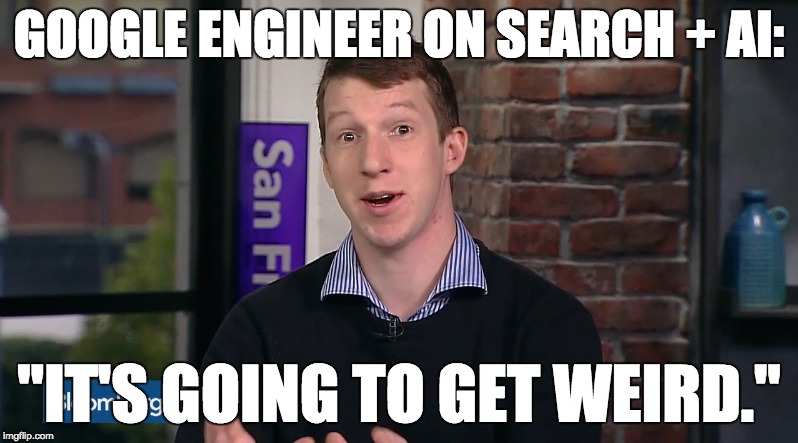Google’s RankBrain and the Future of SEO
It’s no secret that Google has been heavily invested in artificial intelligence research for years, and now we know why (at least in part).  RankBrain is the latest addition to Google’s Hummingbird algorithm: an artificial intelligence program that that has been helping deliver Google search results since the beginning of this year. While it has surpassed engineers’ expectations, quickly becoming their third most important ranking factor, it probably isn’t going to change good SEO tactics overnight. Instead, Google’s RankBrain serves as a timely reminder that SEO needs to continue looking forward and continue innovating, or risk wasting a lot of time and resources on diminishing results.
RankBrain is the latest addition to Google’s Hummingbird algorithm: an artificial intelligence program that that has been helping deliver Google search results since the beginning of this year. While it has surpassed engineers’ expectations, quickly becoming their third most important ranking factor, it probably isn’t going to change good SEO tactics overnight. Instead, Google’s RankBrain serves as a timely reminder that SEO needs to continue looking forward and continue innovating, or risk wasting a lot of time and resources on diminishing results.
What is RankBrain?
RankBrain is an AI program designed by hundreds of Google engineers that, unlike other algorithm components and ranking signals, is designed to think for itself. Other well-known ranking factors—links, domain authority, keyword use, etc.—are individually created by people. RankBrain, by contrast, is a conglomerate ranking factor that engineers designed and then set free to make its own conclusions about what should be ranked and how. It’s quick ascension to the podium is worthy of our attention. Ever since Google’s inception, links have been one of the primary ranking factors. That hasn’t changed, but to see a new algorithm affecting ranking decisions so dramatically, so quickly, is something to take note of. It’s also interesting that Google is openly calling it the third most impactful ranking factor, because it indicates that RankBrain has proven itself to Google engineers. According to the Bloomberg interview, RankBrain beat Google search engineers at recognizing which pages their own search engine technology would rank on top.
I was surprised. I would describe this as having gone better than we would have expected. – George Corrado, Senior Research Scientist, Google
RankBrain really shines when it comes to interpreting unfamiliar queries. Some 15 percent of the queries that Google fields every day have never been typed into a search box before. RankBrain can learn from a related search in order to deliver accurate results for a new, unfamiliar one.
What Does This Mean for SEO Today?
The practical application of computer learning is fascinating, and the implications are staggering, but RankBrain isn’t revolutionizing SEO just yet. The AI machine is only doing a more efficient job of what teams of Google engineers have been doing for years: interpreting user intent, and delivering the most relevant, helpful content available to answer needs and questions. SEO in a world with RankBrain looks the same as it did last week. It’s one more development that continues to lean into the trend of resourceful, user-friendly content. RankBrain will emphasize the strength of modern SEO strategies based on strategic content, as the need for technical or traditional SEO tasks continues to decline. If anything, the development and implementation of a program like RankBrain should indicate where Google engineers saw a need to strengthen their system, and/or an opportunity to widen their competitive edge. That the program’s great strength lies in interpreting those unfamiliar queries is evidence that Google sees a potential for growth in those kinds of searches. Users are getting used to the idea that Google understands natural language. They’re using more long-tail keywords: asking their questions outright instead of trying to Boolean the system to help Google interpret what they want. SEOs and content creators, take note.
How Does RankBrain Work?
I’m not going to pretend to understand all the tech behind an artificial intelligence program. According to the Bloomberg piece:
RankBrain uses artificial intelligence to embed vast amounts of written language into mathematical entities — called vectors — that the computer can understand. If RankBrain sees a word or phrase it isn’t familiar with, the machine can make a guess as to what words or phrases might have a similar meaning and filter the result accordingly, making it more effective at handling never-before-seen search queries.
Other algorithms are based on information that engineers and users feed the Google machine, but they don’t learn themselves. That’s not to say Google doesn’t feed RankBrain. Since a stealthy rollout at the beginning of the year, Google engineers have continued periodic updates of new information to help the AI machine interpret new ideas and concepts.
Welcome to the Future
Last week Doc and Marty were back, now you’re talking to AI when you Google and you didn’t even know it. Maybe the future really is now. If it is, it’s comforting to know that modern SEO has been headed in the right direction. Keep creating compelling, responsive content—designed for the user first, but with search engines in mind. Keep asking your audience what they need, keep analyzing what it is they’re looking for, and keep answering their pain points. RankBrain is just one more way Google is trying to deliver the best answers, which means SEO is still about helping Google find those answers.
For even more on Google’s RankBrain, read Danny Sullivan’s detailed FAQ. And hit me up on Twitter if you have questions or comments!
What's Next?
Profound Strategy is on a mission to help growth-minded marketers turn SEO back into a source of predictable, reliable, scalable business results.
Start winning in organic search and turn SEO into your most efficient marketing channel. Subscribe to updates and join the 6,000+ marketing executives and founders that are changing the way they do SEO:
And dig deeper with some of our best content, such as The CMO’s Guide to Modern SEO, Technical SEO: A Decision Maker’s Guide, and A Modern Framework for SEO Work that Matters.




